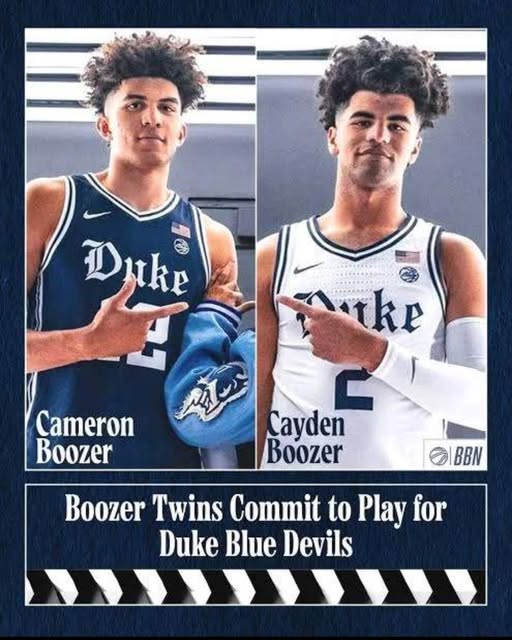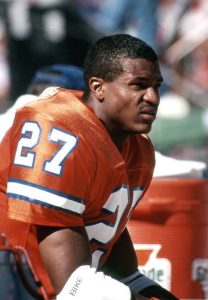
In a move that sent shockwaves throughout the college basketball landscape, the Duke Blue Devils have officially secured a commitment from 7’2 phenom Cameron Boozer. The towering big man, widely considered the No. 1 overall player in the 2026 recruiting class, is not just a monumental addition to Jon Scheyer’s growing dynasty—he could very well be the final, indispensable piece of the puzzle for a national championship run.
But who is Cameron Boozer beyond the headline-grabbing measurements and legacy surname? And can his presence actually tilt the scales in favor of Duke capturing that elusive sixth national title?
Let’s break it down.
A Legacy Rewritten: The Boozer Name Returns to Durham
Cameron Boozer’s name carries significant weight, and for good reason. He’s the son of Duke legend and two-time NBA All-Star Carlos Boozer, who helped lead the Blue Devils to a national title in 2001 under Mike Krzyzewski. Carlos’s bruising style, rebounding prowess, and leadership were hallmarks of one of Duke’s most iconic squads.
Now, over two decades later, Cameron is charting his own path—but with a clear nod to his lineage. Unlike his father, who stood at 6’9 and played with a more traditional post-oriented game, Cameron is a modern big with guard-like agility, an improving jumper, and elite rim protection. At 7’2, he casts a longer shadow—literally and figuratively.
There’s a sense of poetic justice in the younger Boozer returning to Durham. The program that helped elevate his father into stardom is now being entrusted with nurturing the next generational talent in the family. But expectations are sky-high, and fans are asking the same question: Can he deliver?
The Skill Set: A Unicorn in the Paint
Cameron Boozer is not your typical seven-footer. While most players that tall are tethered to the paint, Boozer is surprisingly fluid in the open court. He runs like a wing, finishes with either hand, and has shown flashes of a mid-range and even perimeter game that suggest he could become a legitimate stretch-five.
Defensively, Boozer is a menace. He uses his length to contest shots without fouling and has already drawn comparisons to players like Anthony Davis and Jaren Jackson Jr. for his timing and instincts. He’s not just tall—he’s smart. And that’s where Duke sees his true value.
Scheyer and his staff envision Boozer as a game-altering presence on both ends. Offensively, he can anchor the post while spacing the floor. Defensively, he erases mistakes with weak-side help and can switch onto smaller players in pick-and-rolls—a nightmare matchup for opposing offenses.
But what truly separates Boozer is his basketball IQ. Coaches and scouts alike rave about his decision-making, court vision, and unselfishness. He doesn’t force shots, doesn’t chase stats, and thrives within the team concept—a coach’s dream.
Duke’s Reloaded Roster: A Championship-Caliber Cast
Adding a player of Cameron Boozer’s caliber would be monumental for any program, but it’s especially significant given the roster Jon Scheyer is assembling in Durham. The 2026 Blue Devils are shaping up to be one of the deepest and most talented units in the nation.
Boozer joins a loaded incoming freshman class that already includes five-star point guard Jayden Quaintance, elite scoring wing Koa Peat, and 6’10 stretch forward Malachi Moreno. Add in returning veterans like Caleb Foster, Jared McCain (if he opts to stay), and Tyrese Proctor, and Duke suddenly looks like a team with both elite talent and experience.
The key will be chemistry. Scheyer, entering his fourth season as head coach, has proven he can handle blue-chip egos and high expectations. But managing rotations, establishing roles, and keeping everyone engaged will be his toughest task yet. If he succeeds, this team won’t just be a contender—they could dominate.
Can Boozer Deliver Under Pressure?
Greatness often comes with expectations, and few players in recent memory have entered college basketball with more fanfare than Cameron Boozer. The pressure will be immense, especially at a program like Duke where national championships are the standard—not the aspiration.
The Cameron Crazies will chant his name, NBA scouts will monitor every game, and every performance will be dissected on social media. The real question is: can Boozer handle it?
Based on everything we’ve seen so far, the answer is a resounding yes.
Those close to Boozer describe him as fiercely competitive, grounded, and laser-focused. He’s used to the spotlight, having been a viral sensation since middle school, and he’s already played on some of the biggest amateur stages with Team USA and on the Nike EYBL circuit.
But even the most talented freshmen go through growing pains. Foul trouble, defensive lapses, and offensive slumps are all part of the transition. Boozer’s maturity and mental toughness will be tested, especially when the ACC grind kicks in.
If he can weather those storms—and all signs suggest he can—then Duke may finally have the superstar big it has missed since the days of Zion Williamson and Marvin Bagley III.
The X-Factor: Jon Scheyer’s Evolving Legacy
Jon Scheyer’s transition from Coach K’s top assistant to Duke’s head coach has been smoother than many anticipated. In his first three years, he’s led the Blue Devils to deep March runs, elite recruiting classes, and competitive ACC finishes. But one thing has eluded him: a Final Four.
Scheyer has built teams with elite guard play, versatile wings, and solid depth—but he’s lacked a dominant interior presence. That changes with Boozer.
With a modern big man who can anchor both ends of the floor, Scheyer now has the luxury of playing inside-out, controlling tempo, and dictating matchups. Boozer’s presence alone could mask deficiencies, elevate teammates, and open up Duke’s offensive playbook in ways previously impossible.
This is more than just a big commitment—it’s a potential legacy-defining one for Scheyer.
How Does Duke Stack Up Nationally?
The 2026 college basketball landscape will be ultra-competitive. Blue bloods like Kansas, Kentucky, North Carolina, and Michigan State are all reloading with elite talent. New-age powers like Houston, Alabama, and UConn are building NBA pipelines and embracing analytics. And the transfer portal has blurred the lines between rebuilding and reloading.
Still, with Boozer in the fold, Duke arguably boasts the most complete roster in the country.
They have elite size (Boozer, Moreno), backcourt depth (Foster, McCain, Quaintance), perimeter shooting (Peat, McCain), and defensive versatility. They can run in transition, pound the ball inside, or outshoot opponents from deep.
Barring injury or chemistry issues, there’s no obvious weakness—and that’s a terrifying thought for the rest of the country.
The Intangibles: A Return to Duke Dominance?
Beyond stats and scouting reports, Cameron Boozer represents something even more important: a return to Duke dominance in the post-Coach K era. For years, the Blue Devils were the standard. NBA factories. March regulars. A true basketball brand.
But the last few seasons have brought some doubt. Could Duke maintain its edge without its iconic leader?
With Boozer’s commitment, Duke sends a clear message: The empire is not only alive—it’s thriving.
This isn’t just a five-star signing. It’s a statement. A reminder that Durham is still a dream destination for the best players in the world.





